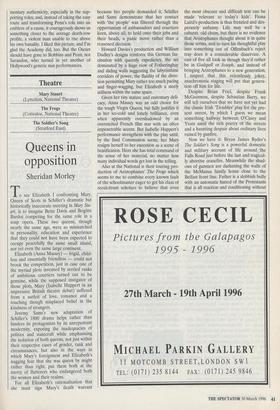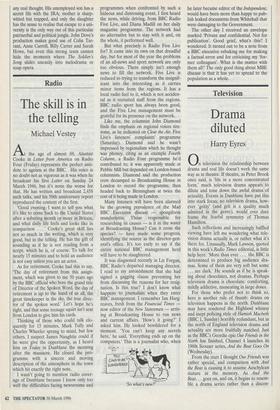Theatre
Mary Stuart (Lyttelton, National Theatre) The Frogs (Cottesloe, National Theatre) The Soldier's Song (Stratford East)
Queens in opposition
Sheridan Morley
To see Elizabeth I confronting Mary, Queen of Scots in Schiller's dramatic but historically inaccurate meeting in Mary Stu- art, is to imagine Bette Davis and Brigitte Bardot competing for the same role in a soap opera. These two queens, though nearly the same age, were so mismatched in personality, education and experience that they could not have been expected to occupy peacefully the same small island, nor yet even the same large continent.
Elizabeth (Anna Massey) — frigid, child- less and essentially friendless — could not brook the competition, just in case one of the myriad plots invented by serried ranks of ambitious courtiers turned out to be genuine, while the supposed instigator of those plots, Mary (Isabelle Huppert in an impressive British theatre debut) suffered from a surfeit of love, romance and a touching though misplaced belief in the kindness of strangers. Jeremy Sams's new adaptation of Schiller's 1800 drama helps rather than hinders its protagonists by its unrepentant modernity, exposing the inadequacies of politics and statecraft while emphasising the isolation of both queens, not just within their respective cases of gender, rank and circumstances, but also in the ways in which Mary's foreignness and Elizabeth's nagging fear that she was queen by might rather than right, put them both at the mercy of flatterers who endangered both the women and their realms.
For all Elizabeth's rationalisation that she must sign Mary's death warrant because her people demanded it, Schiller and Sams demonstrate that her contact with 'the people' was filtered through the opportunism of ambassadors and courtiers keen, above all, to hold onto their jobs and their heads, a panic move rather than a reasoned decision.
Howard Davies's production and William Dudley's designs reinforce this German fas- cination with queenly expediency, the set dominated by a huge view of Fotheringhay and sliding walls suggesting the labyrinthine corridors of power, the fluidity of the direc- tion permitting Mary rather too much pacing and finger-wagging, but Elizabeth a steely stillness within the same space.
Given her tiny stature and customary deli- cacy, Anna Massey was an odd choice for the tough Virgin Queen, but fully justifies it in her ice-cold and lonely brilliance, even when apparently overshadowed by an overexcited French film star with an often impenetrable accent. But Isabelle Huppert's performance strengthens with the play until, by the final Communion scene, her Mary resigns herself to her execution as a scene of beatification. Here she has total command of the sense of her material, no matter how many individual words get lost in the telling.
Also at the National is their touring pro- duction of Aristophanes' The Frogs which seems to me to combine every known fault of the schoolmaster eager to get his class of recalcitrant scholars to believe that even the most obscure and difficult text can be made 'relevant to today's kids'. Fiona Laird's production is thus frenzied and des- perately unfunny. Life may well be a cabaret, old chum, but there is no evidence that Aristophanes thought about it in quite those terms, and to turn his thoughtful play into something out of Offenbach's reject tray does it a considerable disservice. A cast of five all look as though they'd rather be in Godspell or Joseph, and instead of bringing Aristophanes to a new generation, I suspect that this relentlessly jokey, anachronistic staging will put that genera- tion off him for life.
Despite Brian Friel, despite Frank McGuinness, despite Sebastian Barry, we still tell ourselves that we have not yet had the classic Irish 'Troubles' play for the pre- sent unrest, by which I guess we mean something halfway between O'Casey and Yeats amid the rich poetry of the streets and a haunting despair about ordinary lives ruined by gunfire.
Now we have it: Bryan James Ryder's The Soldier's Song is a powerful domestic and military account of life around the Falls Road just before the last and tragical- ly abortive ceasefire. Meanwhile the shad- ows of gunmen are darkening the walls of the McManus family home close to the Belfast front line. Father is a slobbish bully with an automatic hatred of the Protestants that is all reaction and conditioning without any real thought. His unemployed son has a secret life with the IRA; mother is sharp- witted but trapped, and only the daughter has the sense to realise that escape to a uni- versity is the only way out of this particular patriarchal and political jungle. John Dove's production makes good use of Colin Tar- rant, Anne Carroll, Billy Carter and Sarah Howe, but even this strong team cannot hide the moments where The Soldier's Song slides uneasily into melodrama or soap opera.



























































 Previous page
Previous page